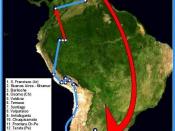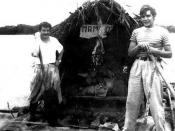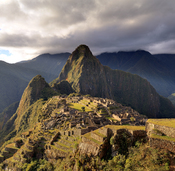In the memoir Motorcycle Diaries, Ernesto Guevara embarks on a journey of self discovery through Latin America. With his companion, Alberto Granado, they set off on their motorcycle, La Ponderosa II. It is the true account of a journey that later turned into a film which touched the souls of many. Most Americans would say a movie's visualizations are better embraced because you are able to witness it as opposed to reading it. Readers are able to connect to Guevara better than the people who watch the movie because he uses such unique and beautiful language to illustrate his journey.
Throughout the book, Guevara expresses through beautiful language how Latin America really is. For example, Ernesto wrote, "The road snakes between the low foothills that sound the beginning of the great cordillera of the Andes, then descends steeply until it reaches an unattractive, miserable town, surrounded in sharp contrast magnificent, densely wooden mountains" (104).
Guevara gives the landscape such an intimate touch. So much detail is put into one sentence that we are immediately able to visualize it. He goes on illustrating every event like this throughout the book. He uses descriptive words that fit perfectly into the sentence. Words like "snakes" and "miserable town" are unique but appropriate. In addition, he uses beautiful phrases like "the great cordillera" and "densely wooden mountains" to create a vivid picture in the reader's mind. Another example of this is on page 127, when Ernesto describes Machu Picchu and Huayna Picchu. "...here we found the pure expression of the most powerful indigenous race in the Americas - untouched by a conquering civilization and full of immensely evocative treasures. The spectacular landscape circling the fortress supplies an essential backdrop, inspiring dreamers to wander its ruins for the sake of it" (127). Here again,


